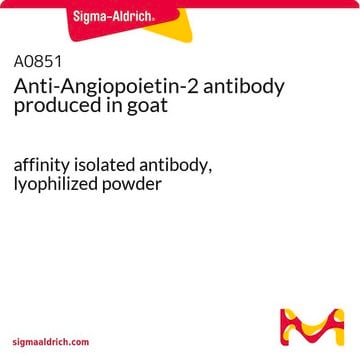Fontos dokumentumok
A0604
Monoclonal Anti-Angiopoietin-1 antibody produced in mouse
clone 171718, purified immunoglobulin
Szinonimák:
Anti-ANG-1
Méret kiválasztása
376 000,00 Ft
Méret kiválasztása
About This Item
376 000,00 Ft
Javasolt termékek
biológiai forrás
mouse
Minőségi szint
konjugátum
unconjugated
antitest forma
purified immunoglobulin
antitest terméktípus
primary antibodies
klón
171718, monoclonal
faj reaktivitás
human
technika/technikák
immunohistochemistry: 25 μg/mL using cells and tissue sections
indirect ELISA: 0.5-1.0 μg/mL
western blot: 1-2 μg/mL
izotípus
IgG2b
UniProt elérési szám
tárolási hőmérséklet
−20°C
célzott transzláció utáni módosítás
unmodified
Géninformáció
human ... ANGPT1(284)
Általános leírás
Immunogén
Alkalmazás
Immunohistochemistry (1 paper)
Biokémiai/fiziológiai hatások
Angiopoietins are growth factors vital for vascular differentiation during normal development. There are four angiopoietins discovered that bind to receptor tyrosine kinases Tie2. Angiopoietin-1 (ANG-1) is a potent pro-angiogenic factor that works by recruits mural cells for endothelial tubule formation and vessel maturation. ANG-1 acts along with VEGF in enhance angiogenesis and increase vascular branching. ANG-1 also affects the inflammatory process and inhibits the capillary transmigration of leukocytes on TNF-α stimulation. Sonic hedgehog, a secreted growth factor, reportedly upregulates the expression of ANG-1. Overexpression of angiopoietins has been observed in a variety of malignancies including neuroblastoma, glioblastoma and lung cancers. While ANG-2 increases the metastasis and angiogenesis of the tumors, ANG-1 inhibits tumor angiogenesis
Fizikai forma
Jogi nyilatkozat
Nem találja a megfelelő terméket?
Próbálja ki a Termékválasztó eszköz. eszközt
javasolt
Tárolási osztály kódja
11 - Combustible Solids
WGK
WGK 1
Lobbanási pont (F)
Not applicable
Lobbanási pont (C)
Not applicable
Egyéni védőeszköz
Eyeshields, Gloves, type N95 (US)
Válasszon a legfrissebb verziók közül:
Már rendelkezik ezzel a termékkel?
Az Ön által nemrégiben megvásárolt termékekre vonatkozó dokumentumokat a Dokumentumtárban találja.
Active Filters
Tudóscsoportunk valamennyi kutatási területen rendelkezik tapasztalattal, beleértve az élettudományt, az anyagtudományt, a kémiai szintézist, a kromatográfiát, az analitikát és még sok más területet.
Lépjen kapcsolatba a szaktanácsadással







